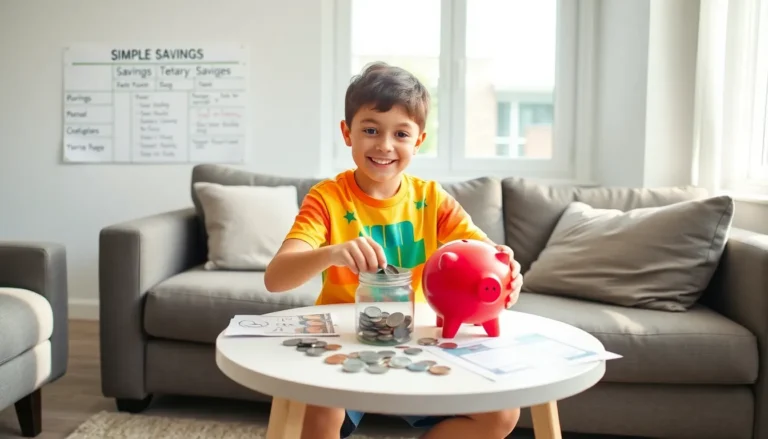The first day of school is a monumental occasion, filled with excitement and a sprinkle of anxiety. For children, it’s the gateway to new adventures, friendships, and the occasional lunchbox mystery. Parents, on the other hand, might find themselves navigating a whirlwind of emotions—joy, nostalgia, and a touch of panic as they wonder if their little one will remember to wear their shoes.
Table of Contents
TogglePreparing for Your Child’s First Day of School
Preparation ensures a smooth transition for both child and parent on this significant day. Several factors contribute to a successful start.
Choosing the Right School
Selecting an appropriate school significantly impacts a child’s educational journey. Parents should consider location, curriculum, and school culture. Researching schools in their area provides valuable insights. Open houses and tours allow parents to observe the environment firsthand. Engaging with other parents can offer additional perspectives on school quality. Ensuring the school aligns with a child’s learning style creates a positive starting point. Various educational approaches, such as Montessori or traditional, may suit different children.
Gathering Supplies and Essentials
Acquiring supplies lays the foundation for a productive school experience. A checklist helps parents organize necessary items, including backpacks, notebooks, and writing tools. Essential items might vary by grade, so consulting the school’s supply list proves beneficial. Including comfort items like lunch boxes and water bottles adds a personal touch. Purchasing supplies in advance reduces stress on the first day. Involving the child in selection fosters excitement and ownership of their school journey. Preparing a designated space for homework and supplies ensures an organized start to the school year.
Emotional Preparation for Children

Emotional preparation for a child’s first day of school plays a crucial role in easing the transition. Addressing fears and anxieties is vital for building confidence.
Addressing Fears and Anxieties
Many children experience worries about new environments and unfamiliar faces. Parents can normalize these feelings by discussing them openly. Parents can ask questions like, “What are you most nervous about?” Engaging in role-playing scenarios can alleviate these concerns. Encouragement can come in many forms, such as sharing personal experiences about starting school. Preparing children by visiting the school beforehand can also create a sense of familiarity. As reassurance increases, a child’s confidence may grow, easing jitters.
Building Excitement for the Big Day
Creating a sense of excitement can transform apprehension into eagerness. Planning special activities, like selecting a first-day outfit, can build anticipation. Involving children in shopping for school supplies promotes ownership over their new journey. Parents can highlight fun aspects, such as meeting new friends or interesting subjects. Reading books about starting school can spark excitement and provide comfort. Creating a countdown calendar helps visualize the upcoming event and fosters enthusiasm. Emphasizing positive experiences prepares children for a successful start.
What to Expect on the First Day
The first day of school presents unique experiences for children, filled with new adventures and social interactions.
Typical School Activities
Expect a variety of engaging activities designed to introduce children to their environment. Many schools organize icebreaker games, allowing kids to interact with peers. Art projects often provide a creative outlet, fostering self-expression from the start. Teachers introduce classroom routines to help create a sense of structure. Children might participate in a brief tour of the facilities, making them familiar with essential locations like the cafeteria and restrooms. Setting a positive tone, these activities create excitement and help ease first-day jitters.
Meeting Teachers and Classmates
Meeting teachers and classmates serves as a crucial part of the first day. First impressions matter; educators aim to create welcoming environments that set the stage for the year ahead. Students typically spend time in small groups, encouraging friendships and connections. Teachers often share their teaching styles and classroom expectations, helping children understand what to anticipate. Meeting fellow students allows for an early sense of community, sparking connections that can strengthen over time. Engaging with classmates helps build friendships, easing the transition into school life.
Tips for Parents on the First Day
Preparing for a child’s first day of school involves thoughtful strategies. Parents play a crucial role in facilitating a smooth transition.
Morning Routine and Send-Off
Establishing a consistent morning routine creates a sense of stability and security. Parents can help by waking up early to avoid last-minute chaos. Packing lunch the night before ensures everything is ready to go. Children enjoy participating in selecting breakfast items that make them excited for the day. Engaging in a brief conversation about the day’s agenda can ease any lingering nerves. Sharing a special goodbye ritual, like a unique handshake or hug, reinforces connection and sets a positive tone. Lastly, arriving early at the school grounds allows children to explore their surroundings before festivities begin.
Staying Connected Throughout the Day
Maintaining communication helps parents reassure children during their first day. Text messages serve as quick reminders of love and support. Sending a small note in their lunch can provide extra comfort and encouragement. Teachers often appreciate any insights shared by parents regarding their child’s feelings. Establishing a point of contact, like a designated teacher, can facilitate timely updates on how the child is adjusting. After school, discussing the day’s highlights creates an opportunity for sharing experiences. This post-day dialogue promotes connection and fosters a positive perspective on school life.
A child’s first day of school marks a pivotal moment in their life filled with excitement and new experiences. By preparing both emotionally and practically, parents can help ease their child’s transition into this new chapter. Engaging in discussions about feelings and creating routines contributes to a sense of security.
Celebrating this milestone through special activities fosters enthusiasm and ownership. As children embark on this journey of learning and friendship, the support from parents plays an essential role in shaping their confidence and adaptability. With thoughtful preparation and encouragement, the first day of school can set the stage for a successful and rewarding academic year ahead.




